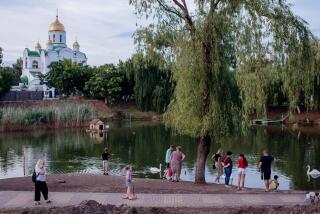Vladivostok Struggles to Attract Foreign Investment : Soviet Far East: Ailing infrastructure is a major stumbling block in efforts to make the region an economic bridge linking the Soviet Union with Pacific Rim nations.
- Share via
VLADIVOSTOK, U.S.S.R. — A Japanese television producer, frustrated in his attempts to communicate with counterparts in the Soviet East Asian capital of Vladivostok, gave two fax machines to the local television station in July.
It was a nice try, but Hiroshi Kikuchi’s gift failed to remedy the situation.
When he returned to Japan, he found telephone lines were so poor he could not get through to his fax machines.
Serious gaps in services and facilities in the Soviet Far East are a major stumbling block in efforts to make the region an economic bridge linking the Soviet Union with the rapidly expanding Pacific Rim nations.
Soviet leader Mikhail Gorbachev envisioned Vladivostok becoming “our widely opened window on the East” in a major policy speech in the city in 1986.
Gorbachev has since agreed to open Vladivostok to foreign travelers in 1991.
The city, which serves as home port to the Soviet Pacific Fleet, has been closed for decades under a cloak of military secrecy.
In preparation for the opening, Vladivostok has invited selected businessmen for a preview.
Their aim is to encourage foreign firms to locate factories in the area to process their natural resources--coal, timber and fish--rather than just shipping them off, as is now the case.
“Today the task is not to sell raw materials but to sell manufactured products,” said Victor Tikhomirov, chief of the foreign economic affairs department for the Primorsky region.
“They have an obsession about value-added processing,” said an American businessman.
Vladivostok hosted more than 400 foreign business delegations in 1989, a government official said.
Most were Chinese, but several were from America, Japan, South Korea, Australia, New Zealand and Western Europe.
Hewlett Packard Co. discussed the possibility of building a computer plant, city officials said. Toyota representatives checked out conditions for automobile assembly, and Alaska Airlines spoke of a flight from Anchorage to Vladivostok, they said.
But their interest has not gone beyond the talking stage.
“They say they want people to come but how can you do business without a fax machine,” asked a Japanese businessman after a recent visit to the area.
“Transportation is bad,” he continued. “Delivery is a problem. They run out of materials. Workers quit because they cannot improve their life style no matter how much they earn.”
“They don’t have the capital, labor or infrastructure to turn out products,” said an American executive in the timber industry.
“There is a lot of bureaucracy,” he said, adding that uncertainty over whether the Soviet Union’s new openness will continue adds risk to any venture.
Against those odds, it seems unlikely Vladivostok will ever attract heavy foreign investment.
But the city’s leaders have launched a sincere drive to do just that.
“We are working at those problems now,” said Valery Lozovoy, who heads up the city’s foreign trade initiative. “We know we cannot improve international contacts without improving our infrastructure.”
Their first task, they believe, is to win more economic freedom from Moscow.
The Soviet East Asians have grown tired of watching their vast stock of resources being sold off and the profits shipped to Moscow.
They want the central government to back off and let them plow the profits from foreign and domestic sales into their sorely lacking infrastructure.
“Only 1.5% of the profits from the export of timber have been returned to the region,” said Igor Sukhachev, head of the regional ministry of external relations.
On average, only about 20% of the profits are returned to the region, but Moscow has recently agreed to increase that figure to between 30% and 80%, Sukhachev said.
The city leaders have begun studying ways to rebuild the airport and communications systems, two areas in desperate need of new funds.
Fifty miles east of Vladivostok, a free economic zone is set to open in 1990 at the deep sea port of Nadhodka.
Special tax incentives will be extended to foreign companies.
But again, lack of services, bureaucratic interference and a problematic work force raise serious doubts about the success of the venture.
More to Read
Sign up for Essential California
The most important California stories and recommendations in your inbox every morning.
You may occasionally receive promotional content from the Los Angeles Times.













